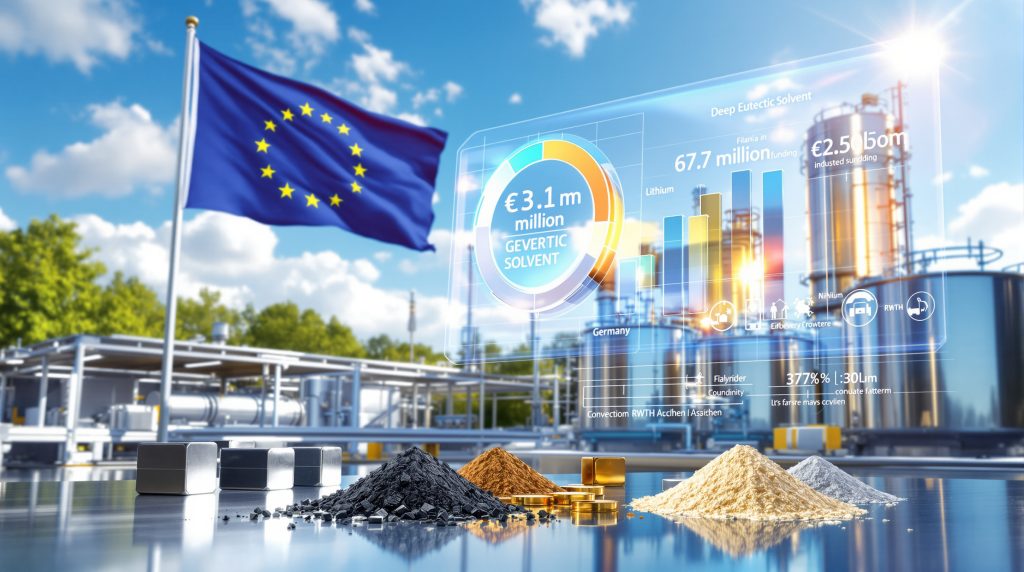Iondrive's Strategic Entry Into European Battery Recycling Markets
The Australian technology company Iondrive has secured participation in a groundbreaking €3.1 million European battery recycling initiative that could reshape how the continent approaches critical mineral recovery. This consortium represents more than just another recycling project – it's a strategic pathway for establishing truly circular battery manufacturing in one of the world's most demanding automotive markets.
Led by RWTH Aachen University, this collaboration brings together specialised companies across the entire battery value chain, from initial dismantling through final cell production. The initiative demonstrates how innovative recycling technologies can compete directly with traditional virgin material extraction while supporting Europe's push toward energy independence.
Understanding the Consortium's Technical Foundation
Iondrive joins European battery recycling consortium with its role centred on its proprietary Deep Eutectic Solvent technology, which processes black mass – the valuable metallic concentrate extracted from spent lithium-ion batteries. This DES approach offers significant environmental advantages over conventional acid-heavy processing methods while maintaining the purity standards demanded by automotive manufacturers.
The consortium's structure integrates complementary expertise through carefully selected partners:
- RWTH Aachen University: Research coordination and project leadership
- Accurec Recycling: Black mass supply and initial battery dismantling
- Iondrive EU GmbH: Advanced metal purification using DES technology
- NEUMAN & ESSER Process Technology: Equipment optimisation and scaling
- Constantia Patz: Materials handling and packaging solutions
- PEM RWTH Aachen University: Electrochemical validation and performance testing
This integrated approach addresses a critical gap in European battery recycling – the lack of domestic processing capabilities that can compete with established Asian facilities. By combining university research with commercial expertise, the consortium aims to demonstrate that European recycling can achieve both cost competitiveness and superior environmental performance.
Financial Structure and Investment Distribution
The consortium operates through a sophisticated funding model that balances public investment with private sector contributions. The German Government of North Rhine-Westphalia provides €2.07 million through a grant administered by Projektträger Jülich, representing approximately 67% of total project costs.
| Component | Amount (EUR) | Amount (AUD) | Share |
|---|---|---|---|
| Government Grant | €2.07M | $3.7M | 67% |
| Industry Co-funding | €1.07M | $1.91M | 33% |
| Total Project | €3.1M | $5.5M | 100% |
For Iondrive specifically, the financial arrangement provides significant risk mitigation. The company's €265,000 contribution will be partially offset by reimbursements covering 60% of pilot plant operating costs, up to €398,000. Additionally, Iondrive receives access to feedstock supplies and validation services at no additional cost, substantially reducing development expenses.
This funding structure reflects Europe's recognition that battery recycling represents a strategic industrial capability requiring coordinated investment. The three-year program timeline allows for comprehensive technology validation while building commercial relationships across the value chain.
Revolutionary Approach to Circular Battery Manufacturing
The consortium's primary technical objective involves demonstrating that batteries manufactured with 80% recycled content can deliver performance equivalent to those using virgin materials. This target represents a significant advancement over current recycling capabilities, which typically achieve much lower recycled content percentages.
The validation process follows a rigorous pathway designed to meet automotive industry standards:
- Black mass processing using Iondrive's DES technology to extract nickel, cobalt, lithium, and manganese
- Material purification to achieve battery-grade specifications
- Cell manufacturing using recycled materials
- Automotive OEM validation through comprehensive performance testing
- Lifecycle assessment comparing recycled versus virgin material performance
The integration of the entire battery value chain from dismantling to cell production creates unprecedented opportunities for validating closed-loop recycling concepts in real-world applications.
This approach addresses several critical industry challenges simultaneously. Traditional recycling often fails to achieve the purity levels required for high-performance battery applications, while the lack of integrated supply chains makes it difficult to validate recycled materials under actual operating conditions.
Why Does Circular Manufacturing Matter?
The move toward circular battery manufacturing represents more than environmental responsibility – it's becoming an economic necessity. Furthermore, advances in battery recycling breakthrough technologies demonstrate that recycled materials can match or exceed virgin material performance in many applications.
European Regulatory Drivers and Market Pressures
The consortium emerges against a backdrop of increasingly stringent European Union regulations governing battery manufacturing and recycling. New legislation mandates higher recycled content in battery cells while imposing stricter collection and processing requirements across member states.
These regulatory changes create immediate commercial opportunities for advanced recycling technologies:
- Mandatory recycled content targets increasing progressively through 2030
- Extended producer responsibility requirements for battery manufacturers
- Import restrictions on batteries failing to meet sustainability criteria
- Carbon footprint declarations favouring locally processed materials
Europe's heavy dependence on Asian processing facilities creates additional strategic vulnerabilities. Currently, most European battery materials require processing in China or other Asian countries before returning for final manufacturing. This creates supply chain risks, carbon footprint concerns, and limited control over processing standards.
The consortium directly addresses these challenges by developing domestic processing capabilities that can compete with established international facilities. Success would reduce European import dependence while supporting regional automotive manufacturing competitiveness.
Technology Validation and Competitive Positioning
Iondrive's participation provides crucial validation for its DES technology in one of the world's most demanding markets. European automotive manufacturers maintain extremely rigorous material specifications, making successful validation a powerful competitive differentiator for global expansion.
The consortium structure offers several strategic advantages for technology development:
Risk mitigation through shared development costs and access to established supply chains
Market validation via direct engagement with automotive OEMs and recycling companies
Intellectual property protection with Iondrive retaining full ownership of technological improvements
Commercial pathway development through integrated partnerships across the value chain
Technical benchmarking will compare DES technology against competing recycling methods across multiple performance metrics. These evaluations will measure environmental impact, processing costs, metal recovery rates, and final product quality to establish competitive positioning.
Pilot Plant Development and Integration Timeline
Construction of Iondrive's large-scale continuous DES pilot plant continues at the University of Adelaide, supported by a $3.9 million grant under Australia's Industry Growth Program. The facility represents a critical scaling step from laboratory demonstrations to commercial processing capabilities.
The development timeline coordinates Australian construction with European integration:
- Late 2025: Final construction and equipment installation in Adelaide
- Early 2026: Commissioning and performance validation
- Mid-2026: Plant relocation to Germany for consortium integration
- 2026-2028: European validation and performance benchmarking
- 2028+: Commercial scaling and technology licensing opportunities
This approach leverages Australia's research capabilities while positioning the technology for European market entry. The pilot plant's modular design facilitates relocation while maintaining operational capabilities during the transition.
How Does This Compare to Global Initiatives?
Similar international programs demonstrate the growing importance of domestic recycling capabilities. For instance, developments in the critical minerals energy transition highlight how countries worldwide are investing in secure supply chains for essential materials.
Strategic Implications for Global Battery Markets
The consortium reflects broader transformation in global battery recycling from experimental technology to commercial necessity. Similar initiatives across North America and Asia create worldwide competition for technological leadership in critical mineral recovery.
Major automotive manufacturers increasingly recognise recycling as essential for securing future material supplies. Supply chain disruptions during recent years highlighted vulnerabilities in virgin material extraction, particularly for cobalt and lithium. Successful recycling technologies offer alternatives that reduce geopolitical risks while supporting sustainability commitments.
Investment patterns demonstrate growing confidence in recycling technologies. Beyond government grants, private sector funding for battery metals investment has expanded dramatically as companies recognise commercial opportunities in the circular economy for critical materials.
Technology Export Opportunities for Australia
Successful validation in Europe positions Australian battery recycling technology for global licensing and partnership opportunities. This development supports Australia's strategic transition from raw material exporter to technology provider in critical mineral supply chains.
The consortium model demonstrates effective collaboration between universities, government, and industry for advancing complex cleantech solutions. This approach could be replicated for other Australian technology initiatives seeking international market entry.
Consequently, as Australia's domestic electric vehicle market expands, Iondrive joins European battery recycling consortium experience will inform development of local recycling capabilities. Early technology development provides competitive advantages in the growing Asia-Pacific battery recycling market.
What About Mining Industry Integration?
The technology's potential extends beyond battery recycling to broader mining applications. However, developing comprehensive waste management solutions requires careful coordination between recycling technologies and traditional mineral processing methods.
Market Psychology and Investment Considerations
The battery recycling sector exhibits characteristics of an emerging technology market transitioning toward commercial viability. Early-stage companies face significant technical and commercial risks, but successful validation can create substantial competitive advantages.
Investment considerations include:
Technology risk – Unproven processing methods may fail to achieve commercial specifications
Market timing – Regulatory requirements and battery waste volumes must align with processing capabilities
Competition – Multiple recycling technologies compete for market share and partnerships
Scaling challenges – Laboratory success doesn't guarantee commercial-scale performance
However, the consortium structure mitigates many typical early-stage risks through shared development costs, established partnerships, and government support. The integrated value chain approach provides clearer pathways to commercial validation than typical technology development programs.
International Recognition and Market Position
Recent coverage from TechInvest Online highlights the strategic importance of this partnership for building Europe's circular supply chain capabilities. This recognition from international technology publications demonstrates growing awareness of Australian innovation in critical mineral processing.
Furthermore, industry analysis from Small Caps Australia emphasises how government-backed initiatives are accelerating technology commercialisation in strategic sectors.
The consortium's integrated approach represents a significant departure from traditional technology development models, where individual companies compete rather than collaborate across value chains.
Transforming Critical Mineral Supply Chains
Iondrive joins European battery recycling consortium represents more than technology validation – it demonstrates how innovative approaches to critical mineral recovery can reshape entire supply chains. The collaboration provides a pathway for Australian technology to compete in global markets while advancing circular economy principles in battery manufacturing.
Success could accelerate adoption of closed-loop battery manufacturing across the automotive industry, reducing dependence on virgin materials while supporting regional supply chain independence. For Iondrive, this consortium offers validation in one of the world's most demanding markets while building commercial relationships essential for global expansion.
As battery recycling transitions from environmental necessity to competitive advantage, early technology leaders are positioning themselves to capture significant opportunities in the expanding circular economy for critical materials. The European consortium demonstrates how coordinated investment in advanced recycling technologies can create both commercial value and strategic independence in critical mineral supply chains.
Disclaimer: This analysis includes forward-looking statements and speculation about technology development, market conditions, and regulatory changes. Actual outcomes may differ significantly from projections discussed. Investment in early-stage technology companies involves substantial risks, and readers should conduct independent research before making investment decisions.
Ready to Capitalise on the Next Major Battery Metals Discovery?
Discovery Alert instantly notifies investors about significant ASX mineral discoveries in lithium, cobalt, nickel and other critical battery materials using its proprietary Discovery IQ model, turning complex exploration data into actionable insights. Begin your 30-day free trial today to position yourself ahead of the market as the battery recycling revolution creates new opportunities in critical minerals exploration.




